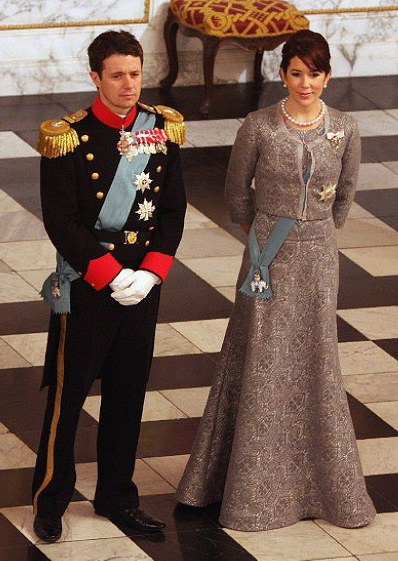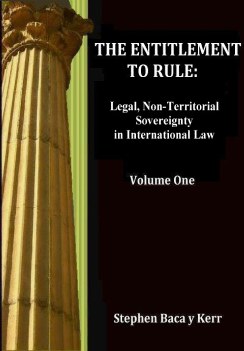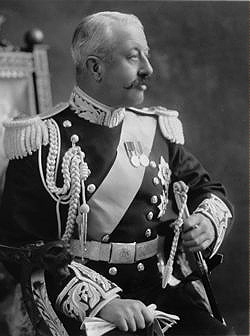The International Commission on Nobility and Royalty
(See Additional Articles below)
General Philosophy & Practices 

All the major legal principles that promote genuine and authentic nobility, royalty and chivalry are contained in the following new two volume book. Note what is says in the first paragraph of the Foreword:
The whole field of nobility and royalty is in disarray and confusion. It is rife with falsehoods, misguided experts, phony princes, and counterfeit chivalric orders. Besides the numerous scams and charlatans that exist, there is a widespread misunderstanding of the international and natural laws that govern dynastic rights. This is a field that is truly divided. This sad state of affairs need not continue. If international law is honored, revered and respected, then everything can be set in its proper order. The grand key to this needed unity is the rule of the just, time-honored laws that already exist.
The author is Dr. Stephen Baca y Kerr, JD, LLM, MAT, former special counsel to the Imperial and Royal House of Habsburg, Professor and Dean of the Law School at the International College of Interdisciplinary Studies. His book is The Entitlement to Rule: Legal, Non-Territorial Sovereignty in International Law and it is a masterpiece. Note excerpts of what people have said about it:
"It is written in a clear and compelling manner. It is hoped that more and more people will become familiar with the laws of justice contained in this book." (Thubten Samphel, director of the Tibet Policy Institute of the Central Tibetan Administration and author of the book Falling Through the Roof, Dharamshala, India)
"It is magnificently done and of great worth." (Adalberto J. Urbina Briceno, Sc.D., Professor Head of the Public International Law Chair of the Catholic University Andres Bello- Caracas)
"It is a goldmine of references and is a valuable account of a [thought provoking] . . . and poorly understood area of law." (Rev'd Professor Noel Cox, LLM, MA, MTheol, Ph.D., LTh, FRHists, Barrister, Aberystwyth University, New Zealand)
"Dr. Kerr has put together a book that is a "one of a kind" providing what is needed to perpetuate the rights of deposed sovereignty. For all those interested in the legal future of nobility and royalty, this is a very important, scholarly and insightful book to read." (LaWanna Blount, Ph.D., F.Coll.T, vice president and professor at the American College of Interdisciplinary Sciences, Como, Mississippi, USA)
"Dr. Kerr's book . . . is one of those . . . path breaking works that throws new light on a field of study . . . on the complex legal and philosophical sinews that keep alive [deposed] monarchies. . . . This type of writing fills a huge gap within the royal studies field. . . ." (Dr. Diana Mandache, historian and author, Budapest, Romania)
"The author obviously has a deep understanding of international law and how it relates to deposed monarchies and exiled governments. The content is well structured and well written. I accept this book as conforming to the highest academic standards expected of a master scholar and practitioner." (Alexander Arapov, Sc.D., Professor of the Department of Philosophy and Sociology of the All-Russian State Distance-Learning Institute of Finance and Economics, a branch of the Financial University of the Russian Federation)
"This has been the most interesting and helpful book I have read in the field of nobiliary law as well as international law . . . . It exemplifies the highest level of scholarly content, clarity and depth of inquiry yet presented on this profound and important subject." (Prof. Dr. Mirjana Radovic-Markovic, Academician, Institute of Economic Sciences and Faculty of Business Economics and Entrepreneurship, Belgrade, Serbia)
This unique book is being offered for free because of its singular importance to the field of nobility and royalty. Go to the website: www.entitlement-to-rule.info.
Subheadings: Click on what may be of interest to you:
Reputation and Integrity 
The status and believability of Board Certification and the Commission itself depends upon accurate, fair and honest determinations. If objectivity is compromised or faulty claims are upheld, then everyone suffers, that is, all certifications become questionable and subject to doubt. Therefore, as stated, all claims are pursued until they are considered to be “beyond reasonable doubt” before they are ever approved for full recognition.
Fundamental or Basic Philosophy 
It is recognized that the certification of titles and ancestry is a complicated business, confusion exists and experts occasionally disagree on what actually constitutes a legal and lawful title of nobility or royalty, and who should be considered noble or of royal blood. Two main philosophies stand out. The domestic legalistic view that would cancel out all rights to anyone not supported by a present or current government agency, and the international legalistic view which recognizes past rights as rightful and enduring perpetually according to the ancient laws that created them in the first place. The article entitled "Sovereignty & the Future of Nobility and Royalty" is an example of the traditional view. Modern international law supports this view. The domestic view would disenfranchise some of the most prominent and well respected houses of Europe--the Hapsburgs and the Prussians as well as some 60,000 other associated noble and royal families, because titles no longer have a legal existence in Germany and are outright illegal in Austria. The International Commission endorses and reflects traditional international view that wholeheartedly confirms ancient sovereign rights to be legitimate and of great worth and value to this and future generations. These assumptions are basic to everything the Commission stands for. They are bedrock beliefs. If you have not yet done so, it is recommended that you read the chapters on "Ideals" and "Sovereignty" to better understand what is at the root of the following views and policies in regard to certification.
international law supports this view. The domestic view would disenfranchise some of the most prominent and well respected houses of Europe--the Hapsburgs and the Prussians as well as some 60,000 other associated noble and royal families, because titles no longer have a legal existence in Germany and are outright illegal in Austria. The International Commission endorses and reflects traditional international view that wholeheartedly confirms ancient sovereign rights to be legitimate and of great worth and value to this and future generations. These assumptions are basic to everything the Commission stands for. They are bedrock beliefs. If you have not yet done so, it is recommended that you read the chapters on "Ideals" and "Sovereignty" to better understand what is at the root of the following views and policies in regard to certification.
General Practices 
All decisions of the Accrediting or Certification Board will be reduced to writing showing the factual basis upon which the conclusions were drawn for each separate case. This and all the evidence submitted will be filed and preserved to perpetuity for the inspection of heirs and descendants as well as board members and will be audited on a yearly basis by a board approved inspector to assure accuracy and fairness, and that proper rules of evidence have been followed in every case.
Sound decisions based upon integrity, objectivity and adherence to high standards are the only way the Commission can maintain a high standing among the nations and a reputation that will assure the public that all decisions are fair and accurate. Hence, there is a great emphasis on certifying only those whose situations are supportable based upon objective facts. For this reason the Commission will maintain and protect its special right as a private organization to reject any petitions it considers to be unworthy of approval, or withdraw such approval, if a serious flaw is discovered in the claim of a certified member.
Public controversy, however, does not constitute a valid reason for rejection or withdrawal. Facts mean everything. And every reasonable effort will be made to support, help and assist any individual involved in such a predicament to resolve it. But in the end, in all such cases, the cold hard facts must be accepted, ratified and approved.
Membership in the ranks of the nobility of the earth or the distinction of being a member of a royal family is highly exclusive. It is a recognized privilege that is inherited or officially conveyed by those who have legitimate royal or noble authority to do so. This kind of status cannot be built on any other foundation than the rock of reality. It cannot be make believe or fantasy. Otherwise, certification becomes meaningless and this organization would come to naught. Verified truth is the only standard we must and will follow in all cases no matter who is involved.
As stated elsewhere, any claim to a title having survived this process for ten years is considered permanent and no longer subject to controversy or cancellation.
General Philosophy on Titles 

It is a well-known fact that since mediaeval times, titles of nobility and royalty have been bought and sold in every nation. Germany, England, France, Spain, the Balkans and others, sold titles of nobility at various times. (see: "Sovereignty" for a number of examples) In the first chapter of the book The Prince written in 1513, Niccolo Machiavelli told how the possession of a principality or kingdom may be obtained. He wrote, “Such dominions . . . are acquired either by the [the force of] arms of the prince himself, or of others, or else by fortune [that is, it was purchased with money] or by ability [by stealth or trickery].” (www.online-literature.com/machiavelli/prince/1) \
In the Holy Roman Empire, purchase made the individual a noble or royal, because "the dignity [titles, noble status, etc.] of States of the Empire was in general attached not to the person but to the fief [land or territory]." (members.aol.com/eurostamm/mediatize.html) “Territories gave titles to their owners . E.g. a man became a count, when a king gave him a country [or he purchased one]. When the county went to a new owner, the old one lost the title.” (www.geocities.com /vrozn/Constit.html) And "investiture . . . could not be denied by the Emperor." It was automatic as soon as the deal was complete. (www.heraldica.org/topics/national/hre.htm#Sovereignty)
In Italy, "there was a time, until 1812 in some regions, when the purchase of land designated 'feudal', ennobled the buyer ipso facto; the purchaser of a comital fief (a county) thus became a count." (www.regalis.com/nobletitles .htm)
In England, according to William Blackstone, "the right of peerage [or nobility was] . . . originally territorial; that is, annexed to lands, honors, castles, manors, and the like, the proprietors and possessors of which were (in right of those estates) allowed to be peers of the realm, . . ." that is, they were counted as nobles. "When the land was alienated, the dignity [the noble title and privilege] passed with it as appendant," that is, the titles were given to its new owner. (Book I, chapter 12 in www.lonang.com/exlibris/blackstone) "An example is the sale of the Earldom of Wigtown by Thomas Fleming, 2nd Earl, to Archibald Douglas, Earl of Galloway in 1371/2 ('Scots Peerage', Vol. 8, p. 523). Another example . . . is the purchase in 1309 by Henry de Percy, 1st Baron Percy (a barony by writ) of the Barony of Alnwick from Anthony Bec, Bishop of Durham. . . ." (www.gmilne.demon.co.uk/Baronies.htm#Introduction)
In Italy, the House of Savoy "by war, purchase or treaty [Amadeus, one of her early rulers] regained other fiefs which his predecessors had lost." Later Emmanuel Philibert Savoy "acquired an extension of seaboard by the purchase of Tenda and Oneglia." Purchase of land and titles was a common practice.
Eventually the feudal titles were recognized as something that could be separated from their property and the owners could sell the intangible property right they owned to another. This is what William Blackstone, the great man of law, called "incorporeal hereditaments" wherein a "dignity" or title of nobility could be owned, purchased or sold. (Book II, chapter 3 which refers one to Book I, chapter 12 in www.lonang.com/exlibris/blackstone) However, with the exception of those in Scotland and other countries, English, Welsh and Irish feudal titles have been legally abolished, and are nonexistent, under the sovereign authority of their rightful kings by an act of the English Parliament in 1660 (Tenures Abolition Act 1660) and an act of the Irish Parliament in 1662 (Tenures Abolition Act 1662), which laws are still recognized as valid and binding. The Fitzwalter case in 1670 confirmed and gave the official interpretation of these laws with the royal pronouncement of the King and Privy Council. It stated that English, and by implication, Irish feudal titles or "baronies by tenure had been discontinued for many years and were not to be revived, nor any right of succession based on them." In the Berkeley case in 1861, the House of Lords committee ruled that "whatever might have been the case in the past, baronies by tenure no longer existed, and any which had existed were converted into Baronies by Writ by the Tenures Abolition Act 1660." The Redesdale Reports confirmed all the above. Therefore, the International Commission cannot recognize any conveyances of an English, Welsh or Irish feudal title as being legitimate. Because they are against the law. Some English, Welsh and Irish feudal titles were turned into honorific titles via Letters Patient, the legal recognition of an authorized herald, when their word in such matters in ancient times took on the authority of law, or by a summons to Parliament from the Crown. Such titles were honorific titles and were hereditable. However, honorific titles cannot be bought or sold. They live or die with the families who were granted them. If the family becomes extinct, the titles revert to the Crown. Normally feudal titles can be bought and sold unless they are not legal entities.
been legally abolished, and are nonexistent, under the sovereign authority of their rightful kings by an act of the English Parliament in 1660 (Tenures Abolition Act 1660) and an act of the Irish Parliament in 1662 (Tenures Abolition Act 1662), which laws are still recognized as valid and binding. The Fitzwalter case in 1670 confirmed and gave the official interpretation of these laws with the royal pronouncement of the King and Privy Council. It stated that English, and by implication, Irish feudal titles or "baronies by tenure had been discontinued for many years and were not to be revived, nor any right of succession based on them." In the Berkeley case in 1861, the House of Lords committee ruled that "whatever might have been the case in the past, baronies by tenure no longer existed, and any which had existed were converted into Baronies by Writ by the Tenures Abolition Act 1660." The Redesdale Reports confirmed all the above. Therefore, the International Commission cannot recognize any conveyances of an English, Welsh or Irish feudal title as being legitimate. Because they are against the law. Some English, Welsh and Irish feudal titles were turned into honorific titles via Letters Patient, the legal recognition of an authorized herald, when their word in such matters in ancient times took on the authority of law, or by a summons to Parliament from the Crown. Such titles were honorific titles and were hereditable. However, honorific titles cannot be bought or sold. They live or die with the families who were granted them. If the family becomes extinct, the titles revert to the Crown. Normally feudal titles can be bought and sold unless they are not legal entities.
In Scotland, incorporeal hereditaments or the feudal title of baron is a legal entity and can be bought and sold.
The Lord of Lyons Court of Scotland is accepting and recognizing Scotish barons with ". . . a helm appropriate to their degree, that is, to the dignity of baron, and will be recognised in the style of “baron of X.” (www.lyon-court.com/lordlyon/616.html)
The practice of legitimately selling ancient feudal titles of nobility or royalty, or even creating them, has continued quietly into modern times. (See the following web page on some valid examples of title changes and new creations by virtue of ancient sovereign authority. The article is written by Guy Stair Sainty and is entitled: "German and Austrian Royal or Noble Name or Title Changes Other than by Adoption after 1918:" (www.chivalricorders.org/nobility/germtitl.htm) As an example from this article, Dr. Otto von Hapsburg, in his full imperial status as titular emperor of Austria, in 1949 granted the title of Prince or Princess of Altenburg to the descendants of one set of his family who had contracted morganatic marriages, and more recently has stated that the issue of unequal marriages, for which permission has been sought and given, may use the title of Count (or Countess) of Hapsburg-Lothringen. Although not fully complimentary to sovereign rights, the following website is another example of titles created and individuals ennobled from another "de jure" sovereign---the Royal House of Savoy: www.maineworldnewsservice
We have no argument when such is done properly by those who truly own the lawfulright to do so. It is the those who sell falsehoods, and those that believe that their fake and counterfeit titles are genuine, that are the threat. The International Commission on Nobility and Royalty was created to counter the scammers who lie in wait to deceive, and those who pretend to be something they are not. But true title holders who were legitimately created as such will be upheld.
 A well-known example is Radu Duda, the husband of Princess Margarita of Romania, who was created Prince of Hohenzollern-Veringen (ad personam) on 1 January 1999 by order of Prince Friedrich Wilhelm of Hohenzollern with the approval of King Michael I of Romania. This is probably a valid conferral, because no objection was raised by those who held the high right of sovereignty in this case--the Imperial Hohenzollern family of Germany, therefore, by implied consent and recognition, this title became an accepted and recognized fact in European circles. (see www.btinternet.com/~allan_raymond/Roumanian
A well-known example is Radu Duda, the husband of Princess Margarita of Romania, who was created Prince of Hohenzollern-Veringen (ad personam) on 1 January 1999 by order of Prince Friedrich Wilhelm of Hohenzollern with the approval of King Michael I of Romania. This is probably a valid conferral, because no objection was raised by those who held the high right of sovereignty in this case--the Imperial Hohenzollern family of Germany, therefore, by implied consent and recognition, this title became an accepted and recognized fact in European circles. (see www.btinternet.com/~allan_raymond/Roumanian_Royal_Family.htm and www.princeradu.ro/en/index.html) Now, some would point out that this is only a name change, not a title, but that is just a technicality because of the present republican regime in Germany. However, to the people involved and the world at large, it is a grand title and a very exalted one at that. But, and this is important, for the Commission to actually certify such a person, they would have to have in writing the approval of those who have the legitimate sovereign authority, to put their stamp of approval on it, that is, to authenticate it. With that, he could be certified on the level of beyond reasonable doubt.
Since the writing of the above paragraph, His Majesty King Michael I of Romania elevated Radu Duda to the title of HRH Prince of Romania on December 30, 2007. This designation ends all controversy as the King has all the authority of a sovereign ruler---the true and rightful Monarch of the Kingdom of Romania. He is the embodiment of the kingdom, not the present republic or it's old constitution. (See: "Sovereignty & The Future of Nobility and Royalty" to understand his absolute power under international law.) The king also made his daughter, HRH Crown Princess Margareta, as his successor and appointed nine others and gave them succession rights including his grandson Nicolae de Romania who he also elevated to the title of Prince and His Royal Highness.
Along these lines, The International Commission will not accept any ruling made by a subsequent republican government in regard to the affairs of former kingdoms, principalities or empires as they have absolutely no jurisdiction, authority or any rights over the past. Only the rightful heirs or successors to the thrones of these nations have this exclusive "de jure" authority and no one else. In this they still reign supreme. The Commission, therefore, recognizes the genuine right of any true sovereign, regnant or "de jure," whether they are called Noble, Royal or Imperial as long as they are or were sovereign, to privately sell the old feudal titles they truly possess and own, or create new titles or orders of knighthood and chivalry, which is their solemn right and privilege, if they held recognized sovereignty at some time in the past, and have never forsaken their "de jure" rights. (See: "Orders of Chivalry" where some "de jure" sovereigns have created new orders of chivalry and are recognized as valid by the ICOC: The International Commission on Orders of Chivalry) If what is done by a "de jure" sovereign or reigning king, prince, duke or count is accomplished officially, legally and lawfully, and can be verified and confirmed as such, then proper and full recognition can be given to it; and no fraud, duplication, or confusion will result by the special ennoblement thereof. (see "Sovereignty")
sovereign or reigning king, prince, duke or count is accomplished officially, legally and lawfully, and can be verified and confirmed as such, then proper and full recognition can be given to it; and no fraud, duplication, or confusion will result by the special ennoblement thereof. (see "Sovereignty")
In other words, the royal houses and sovereign nobility still own all their titles and "de jure" sovereignty, according to the traditional law of rights, and will do so forever by hereditary right, even if current law in subsequent governments prevent them from using them; such as, in Germany, Austria, India or some other republics. If there is no legal mechanism for conveying such authentic titles to someone else in their own native land, legal conveyances of such may be accomplished in another country or nation where the law allows and supports such transfers or conveyances. The point being, conveyances must be legal, rightful and official from rightful sources. If they are, then, they are acceptable.
One of the major purposes of the Commission is to protect, promote and certify the real genuine title holders, whether that comes by lawful inheritance, marriage, adoption or by legitimate sale, so imposters can be exposed, and the real ones honored for what they legitimately and truly hold.
Adoptions, in some cases, can legally provide to the adoptive person certain rights to lawfully bear an ancient title of nobility and/or a time honored name. However, unless the recognized head of the whole entire family or clan or extended family acknowledges and accepts that adoption, the individual cannot be certified or regarded as authentic, in any way. It is the supreme authority of sovereignty whether regnant or "de juried" that make this acceptable and certifiable. Otherwise, it is only a name change and nothing more. In fact, it is misleading and dishonest, because it give the impression of a true title when it is not. Such a name change is an act of deceit.
In other words, a person may be adopted by a noble family, and may legally bear their adopted last name, but cannot be recognized as a part of the royal or noble elite, unless the appropriate sovereign sanctions and accepts it. If the sovereign head of the family ratifies the adoption and gives it his full blessing, approval and recognition, then, and only then, can such an individual be certified, and, to all intents and purposes, could that individual be fully acknowledged as part of the nobility and/or royalty of that particular family line. Such is the actual power of a true sovereign. Without this recognition, there can be no genuine legitimacy created through an adoption. (see the chapter on "Sovereignty")
If the actual conveyors of any title via adoption or purchase wish to remain anonymous to the world at large, the Commission will honor that desire, but they must reveal their identity and all the required legal information sufficient for the Commission to be able to verify and confirm it as an authentic transaction. They must also sign papers that the full truth can be openly revealed at some time in the future, even if it is fifty years from the time of the conveyance. Otherwise, the title cannot receive the recognition for which it might be due.
In a different situation, having nothing to do with an adoption, a commoner may obtain a legitimate title, but this does not mean that the individual is now automatically a full fledged member of the nobility. A genuinely titled person, to be certified as a noble or royal person, or even a descendant of such, is a whole new consideration and depends on being able to prove in public records that one’s claim is true and accurately reflects reality.
even a descendant of such, is a whole new consideration and depends on being able to prove in public records that one’s claim is true and accurately reflects reality.
In deliberating on a claim to title, the International Commission recognizes that laws and practices vary from nation to nation. The Commission, therefore, operates on the basis that each case is unique. The historical setting of a title, its source, the type of title it is, whether feudal, honorific, hereditary or life peerage, etc., and the unique laws, ancient and modern, that apply, as well as how those laws are practiced and accepted in real life, all must be examined to determine legitimacy in the here and now.
Common sense and fair play must be considered, as well as ancient and modern laws, where appropriate. Therefore, the International Commission on Nobility and Royalty does not arbitrarily defend the attitudes and beliefs of the so-called “old guard,” the editors of any private publication, or those who espouse new liberal views that deny history and precedence. Therefore titles and honors are not necessarily denied or acknowledged to be legitimate just because of ancient rules. In other words, rather than be frozen in time or being immoveable, the Commission may recognize the right for changes in house rules, in many instances, to permit unequal or morganatic marriages and even undo past decisions. What the recognized head of the sovereign family believes and accepts is generally considered to be far more important than any ancient rules. Therefore, old discarded lines may possibly obtain recognition from the present Head, and, thereby, could again be recognized and certified as such, and thus again bear the titles of their ancestors. The lower nobility, never holding sovereignty, could apply to the head of the particular sovereign family that they were once subservient to in history, otherwise such have little or no recourse to change anything.
Again, the only way titles or any kind of recognition can be restored and certified is by an official ruling by the proper reigning or "de jure" sovereign. This is the bottom line. Their authority is above all others. Once made, such a decision establishing or renewing an ancient title is considered to be unending and incontrovertible and, therefore, cannot be retracted from a family as it becomes the property of those families. There is overwhelming precedence for this in law. Hence, as far as the International Commission is concerned, such a landmark decision by a reigning or "de juried" monarch is considered to be perpetual, permanent and legally binding on the present and on the future.
Manorialism in Europe encompassed Kings, Emperors, Sovereign Princes, Dukes, Counts, Barons all the way down to serfs, such that, a manorial title could be any and all titles ever use by the nobility, but there was no such thing as a "manor lord" or "lord of a manor" per se. “Manor lords” are primarily a product of the United Kingdom. Since they were never, at any time, considered to be part of the nobility in Great Britain, they cannot be considered as such today. Such a title can be approved by the board for recognition as a feudal title of the United Kingdom, but not as a title of nobility. (See: "Policy Changes")
General Philosophy on Knighthood 
Knighthood is another area that presents some interesting problems of its own, especially with the proliferation of self-styled orders and the determination of their legitimacy. Professor of Law and international lawyer, Stephen Kerr, JD made it clear that "the validity or legitimacy of an order of chivalry depends upon its possession of a sovereign fons honorum. . . ." (See: "Dynastic Law") We consider this to be self-evident, but it needs to be made crystal clear that the great honor of knighthood is the exclusive domain or property of the sovereign nobility and royalty of the earth. Therefore, an applicant must produce documentation that he or she has been knighted by a living sovereign, or living non-reigning sovereign, either personally or vicariously. That is, by his or her direct or indirect approval, such as, through an organization sponsored and patronized by him or her. No others are considered to legitimately hold a valid title of knighthood.
the great honor of knighthood is the exclusive domain or property of the sovereign nobility and royalty of the earth. Therefore, an applicant must produce documentation that he or she has been knighted by a living sovereign, or living non-reigning sovereign, either personally or vicariously. That is, by his or her direct or indirect approval, such as, through an organization sponsored and patronized by him or her. No others are considered to legitimately hold a valid title of knighthood.
The head of a church could only establish true knights if that individual church at one time held true and recognized sovereignty, and did not voluntarily give it away or lose it by failing to maintain the needed diplomatic protest as required by international law. (See: "Sovereignty & The Future of Nobility and Royalty")
Secular state orders are not considered to confer true knighthood as a true order or dynastic order would and does. Too much of the spirit of chivalry is completely devoid and deliberately renounced in state orders to consider them to be anything more than the recognition of merit, while a true knighthood bestows a mission of care and concern for ideals and for the welfare of the downtrodden and oppressed.
All orders of chivalry approved by the International Commission on Orders of Chivalry (ICOC) are approved and recognized. (see: www.icocregister.org and the page on "Orders of Chivalry") A knight of any such order is automatically considered to be certifiable on the highest level--that of beyond any reasonable doubt or above 90% assurance.
Also, the Board only recognizes the title of “knight.” Titles, such as, knight bachelor, knight grand cross or knight commander, etc. are merely considered to be private titles of orders. The title of “sir,” although most exclusively used in England and some of the Commonwealth nations, can be used by anyone authorized to use it by a true sovereign, or non-reigning individual holding the exclusive right of sovereignty, because such have the full authority to create titles. This, however, is not necessarily recommended as it is untraditional except in England and various Commonwealth nations and in some Asian countries. Nevertheless a true sovereign, whose forefathers held full sovereignty at some point in history, regardless of tradition, does hold the right to create this title, or any title, and give it to whomsoever he or she wishes. (See: "Sovereignty & The Future of Nobility and Royalty") See also the article "Chivalry and Modern Times."
Quality Assurance 
The International Commission on Nobility and Royalty has authorized a special Certification or Accrediting Board to represent them in determining, according to ancient and modern laws and rules of evidence, if an individual qualifies for recognition. Decisions are audited by the Board of Directors at least on an annual basis, and all decisions of the Certification Board must be unanimously agreed upon to help ensure that decisions are of the highest quality possible. Again, levels of assurance are, one, beyond reasonable doubt (90% level), and, two, clear and convincing (70% level).
Among other checks and balances designed to protect the organization from having hidden agendas or unwarranted outside influence, the International Commission on Nobility and Royalty will not accept contributions of any kind except through the Office of the Special Representatives, lest an official member of the Certification Board feel obligated or influenced to become partial or compromise his or her judgment of the facts. In addition, board membership is held in confidence during the time they serve to help prevent them from being contacted or biased by interested parties.
To further protect and safeguard the Commission, no member of the Board of Directors, Certification Board, Special Representatives, Investigators, Officers or Employees of any kind will personally use an uncertified title, or claim nobility, royalty or illustrious ancestors unless such claims have been properly verified through the Commission and established as an authentic verified claim clearly based on the facts.
One of the adopted protective measures is that all charges are made reasonable and affordable, so that greed or a profit motive never takes over the organization. To do otherwise, could so easily distort the high ethical values and standards established to maintain reliability and permanence, which is utmost in our priorities.
These precautions and others that will be specified later may seem unnecessarily hard, but they are needed to ensure long standing credibility. Other organizations have faltered and lost respect in the world because they operated without such checks and balances. These precautions, it is hoped, will act as a way of protecting everyone involved. Long term integrity is considered to be of monumental importance.
Title Deflation: Ruining Something Beautiful 
 The fact that it is within one’s "de jure" rights, or authority to create titles, or sell off old feudal titles, is not to be construed as wholesale permission to go into the business of conveying titles. Although such is totally within one's authority, if one has had sovereignty conferred upon them, and/or legitimately owns a true sellable title, but to do so may also be a threat, and a danger, to nobility and royalty worldwide as much as the contribution of imposters. It is a well-known maxim or truism that too much of anything cheapens it in the eyes of the public. It is like diluting milk with too much water. It becomes less valued, less important, and diminished in worth. Deflation and/or erosion is a good word for it.
The fact that it is within one’s "de jure" rights, or authority to create titles, or sell off old feudal titles, is not to be construed as wholesale permission to go into the business of conveying titles. Although such is totally within one's authority, if one has had sovereignty conferred upon them, and/or legitimately owns a true sellable title, but to do so may also be a threat, and a danger, to nobility and royalty worldwide as much as the contribution of imposters. It is a well-known maxim or truism that too much of anything cheapens it in the eyes of the public. It is like diluting milk with too much water. It becomes less valued, less important, and diminished in worth. Deflation and/or erosion is a good word for it.
To curb this potential problem, the International Commission will not condone any noble or royal going into the business of being a title peddler, even if the titles are authentic and genuine. One cannot do such with impunity without affronting common decency, and denigrating the ideals and reputation of nobility and royalty worldwide.
It is recommended that if one, after careful consideration, decides to give out a title, that it is done for free, or at least not sold often, to preserve the integrity of all the true noble and royal houses in every country and nation. But, how much is too often is very difficult to define. Let's just say, that if one gives out a title, we would hope that the receipient is truly worthy and exemplary in every way.
The real problem, of course, are the charlatans, not any of the real and genuine sources of honor.
Succession Problems 
Royal houses with two or more claimants often have great difficulty resolving their differences. Each is highly motivated to hold onto their arguments instead of solving the situation. The International Commission could help a "de jure" royal family as neutral arbitrators. However, the Commission will not entertain the idea of being involved unless all parties to a claim cooperate and support the Commission with all the required evidence and arguments needed as well as allow for expert witnesses to be consulted. Otherwise, a fair and equitable ruling becomes impossible, if not extremely difficult. In other words, the Commission will not get involved in any unfair proceedings where facts are withheld or hidden in order to manipulate the outcome. If the truth, the whole truth and nothing but the truth cannot exist in a case, we must respectfully withdraw or decline to be involved. This is in the best interests of everyone involved. No arbitrary or capricious decisions will be tolerated.
If no claim is clearly better than any other, then the only way to solve the problem is for the parties to use their jointly held rights to decide upon a single head and to rewrite their house rules accordingly to preserve their family rights to the end of time.
For the Protection of Everyone 
The Commission can be contacted similar to any typical licensing board to see if an individual is actually certified or not, if the individual gives permission for such. Petitions or claims that are investigated and turned down or rejected, based on insufficient or contrary evidence, will be held in strict confidence. In addition to further protect confidentiality, all names and records of any claim that are rejected will only be kept for one year for a Board auditor to review and then will be destroyed unless directed otherwise. The Commission will never at any time publish a list of false nobles or persons claiming royalty who are bogus who have applied for certification. In addition, we will only proclaim the true and the real and honor them if given permission to do so.
For a small fee, a letter of verification assuring certification from the Commission will be sent to anyone a certified member wishes. In addition, at a members request, the official certification document itself that describes all the factual information upon which the approval was based, similar to a transcript, will be released in the same way a university releases the official records of its students when such has been properly authorized in writing by the individual concerned.
Validity of claims may be confirmed by e-mail by contacting the Commission. Through this method certified members can be confirmed as bonafide nobles or royals, to show that they have genuine or authentic titles of nobility or royalty or knighthood, and/or to have true illustrious ancestors. However, this information can only be revealed by permission of the individual concerned.
We encourage you to read and enjoy the articles that follow, which are informative and can deepen one's understanding of the whys and wherefores as well as the true and permanent rights of royalty, nobility and chivalry. The following articles are considered to be especially important and valuable:
Use "Contact" to join the Commission as a contributor or apply for certification for titles, knighthood, status or ancestry. Our goals and mission are to protect the public from counterfeit titles, phony knighthoods and fake genealogies. We certify the true and the genuine as well as promote chivalry, royalty and nobility. There is so much that needs to be done. We invite you to contribute and join with us.
Contact or donate through the following:
© Copyright 2005/2009 -- International Commission on Nobility and Royalty. All Rights Reserved.

 international law supports this view. The domestic view would disenfranchise some of the most prominent and well respected houses of Europe--the Hapsburgs and the Prussians as well as some 60,000 other associated noble and royal families, because titles no longer have a legal existence in Germany and are outright illegal in Austria. The International Commission endorses and reflects traditional international view that wholeheartedly confirms ancient sovereign rights to be legitimate and of great worth and value to this and future generations. These assumptions are basic to everything the Commission stands for. They are bedrock beliefs. If you have not yet done so, it is recommended that you read the chapters on "Ideals" and "Sovereignty" to better understand what is at the root of the following views and policies in regard to certification.
international law supports this view. The domestic view would disenfranchise some of the most prominent and well respected houses of Europe--the Hapsburgs and the Prussians as well as some 60,000 other associated noble and royal families, because titles no longer have a legal existence in Germany and are outright illegal in Austria. The International Commission endorses and reflects traditional international view that wholeheartedly confirms ancient sovereign rights to be legitimate and of great worth and value to this and future generations. These assumptions are basic to everything the Commission stands for. They are bedrock beliefs. If you have not yet done so, it is recommended that you read the chapters on "Ideals" and "Sovereignty" to better understand what is at the root of the following views and policies in regard to certification. been legally abolished, and are nonexistent, under the sovereign authority of their rightful kings by an act of the English Parliament in 1660 (Tenures Abolition Act 1660) and an act of the Irish Parliament in 1662 (Tenures Abolition Act 1662), which laws are still recognized as valid and binding. The Fitzwalter case in 1670 confirmed and gave the official interpretation of these laws with the royal pronouncement of the King and Privy Council. It stated that English, and by implication, Irish feudal titles or "baronies by tenure had been discontinued for many years and were not to be revived, nor any right of succession based on them." In the Berkeley case in 1861, the House of Lords committee ruled that "whatever might have been the case in the past, baronies by tenure no longer existed, and any which had existed were converted into Baronies by Writ by the Tenures Abolition Act 1660." The Redesdale Reports confirmed all the above. Therefore, the International Commission cannot recognize any conveyances of an English, Welsh or Irish feudal title as being legitimate. Because they are against the law. Some English, Welsh and Irish feudal titles were turned into honorific titles via Letters Patient, the legal recognition of an authorized herald, when their word in such matters in ancient times took on the authority of law, or by a summons to Parliament from the Crown. Such titles were honorific titles and were hereditable. However, honorific titles cannot be bought or sold. They live or die with the families who were granted them. If the family becomes extinct, the titles revert to the Crown. Normally feudal titles can be bought and sold unless they are not legal entities.
been legally abolished, and are nonexistent, under the sovereign authority of their rightful kings by an act of the English Parliament in 1660 (Tenures Abolition Act 1660) and an act of the Irish Parliament in 1662 (Tenures Abolition Act 1662), which laws are still recognized as valid and binding. The Fitzwalter case in 1670 confirmed and gave the official interpretation of these laws with the royal pronouncement of the King and Privy Council. It stated that English, and by implication, Irish feudal titles or "baronies by tenure had been discontinued for many years and were not to be revived, nor any right of succession based on them." In the Berkeley case in 1861, the House of Lords committee ruled that "whatever might have been the case in the past, baronies by tenure no longer existed, and any which had existed were converted into Baronies by Writ by the Tenures Abolition Act 1660." The Redesdale Reports confirmed all the above. Therefore, the International Commission cannot recognize any conveyances of an English, Welsh or Irish feudal title as being legitimate. Because they are against the law. Some English, Welsh and Irish feudal titles were turned into honorific titles via Letters Patient, the legal recognition of an authorized herald, when their word in such matters in ancient times took on the authority of law, or by a summons to Parliament from the Crown. Such titles were honorific titles and were hereditable. However, honorific titles cannot be bought or sold. They live or die with the families who were granted them. If the family becomes extinct, the titles revert to the Crown. Normally feudal titles can be bought and sold unless they are not legal entities.  A well-known example is Radu Duda, the husband of Princess Margarita of Romania, who was created Prince of Hohenzollern-Veringen (ad personam) on 1 January 1999 by order of Prince Friedrich Wilhelm of Hohenzollern with the approval of King Michael I of Romania. This is probably a valid conferral, because no objection was raised by those who held the high right of sovereignty in this case--the Imperial Hohenzollern family of Germany, therefore, by implied consent and recognition, this title became an accepted and recognized fact in European circles. (see www.btinternet.com/~allan_raymond/Roumanian
A well-known example is Radu Duda, the husband of Princess Margarita of Romania, who was created Prince of Hohenzollern-Veringen (ad personam) on 1 January 1999 by order of Prince Friedrich Wilhelm of Hohenzollern with the approval of King Michael I of Romania. This is probably a valid conferral, because no objection was raised by those who held the high right of sovereignty in this case--the Imperial Hohenzollern family of Germany, therefore, by implied consent and recognition, this title became an accepted and recognized fact in European circles. (see www.btinternet.com/~allan_raymond/Roumanian sovereign or reigning king, prince, duke or count is accomplished officially, legally and lawfully, and can be verified and confirmed as such, then proper and full recognition can be given to it; and no fraud, duplication, or confusion will result by the special ennoblement thereof. (see "Sovereignty")
sovereign or reigning king, prince, duke or count is accomplished officially, legally and lawfully, and can be verified and confirmed as such, then proper and full recognition can be given to it; and no fraud, duplication, or confusion will result by the special ennoblement thereof. (see "Sovereignty")  even a descendant of such, is a whole new consideration and depends on being able to prove in public records that one’s claim is true and accurately reflects reality.
even a descendant of such, is a whole new consideration and depends on being able to prove in public records that one’s claim is true and accurately reflects reality. the great honor of knighthood is the exclusive domain or property of the sovereign nobility and royalty of the earth. Therefore, an applicant must produce documentation that he or she has been knighted by a living sovereign, or living non-reigning sovereign, either personally or vicariously. That is, by his or her direct or indirect approval, such as, through an organization sponsored and patronized by him or her. No others are considered to legitimately hold a valid title of knighthood.
the great honor of knighthood is the exclusive domain or property of the sovereign nobility and royalty of the earth. Therefore, an applicant must produce documentation that he or she has been knighted by a living sovereign, or living non-reigning sovereign, either personally or vicariously. That is, by his or her direct or indirect approval, such as, through an organization sponsored and patronized by him or her. No others are considered to legitimately hold a valid title of knighthood.  The fact that it is within one’s "de jure" rights, or authority to create titles, or sell off old feudal titles, is not to be construed as wholesale permission to go into the business of conveying titles. Although such is totally within one's authority, if one has had sovereignty conferred upon them, and/or legitimately owns a true sellable title, but to do so may also be a threat, and a danger, to nobility and royalty worldwide as much as the contribution of imposters. It is a well-known maxim or truism that too much of anything cheapens it in the eyes of the public. It is like diluting milk with too much water. It becomes less valued, less important, and diminished in worth. Deflation and/or erosion is a good word for it.
The fact that it is within one’s "de jure" rights, or authority to create titles, or sell off old feudal titles, is not to be construed as wholesale permission to go into the business of conveying titles. Although such is totally within one's authority, if one has had sovereignty conferred upon them, and/or legitimately owns a true sellable title, but to do so may also be a threat, and a danger, to nobility and royalty worldwide as much as the contribution of imposters. It is a well-known maxim or truism that too much of anything cheapens it in the eyes of the public. It is like diluting milk with too much water. It becomes less valued, less important, and diminished in worth. Deflation and/or erosion is a good word for it. 

